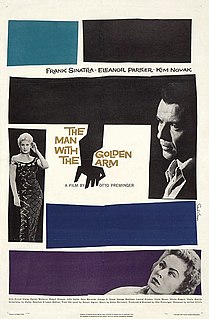
The Man with the Golden Arm is a 1955 American drama film with elements of film noir, based on the novel of the same name by Nelson Algren. It recounts the story of a drug addict who gets clean while in prison, but struggles to stay that way in the outside world. Although the addictive drug is never identified in the film, according to the American Film Institute "most contemporary and modern sources assume that it is heroin", in contrast to Algren's book which named the drug as morphine. The film stars Frank Sinatra, Eleanor Parker, Kim Novak, Arnold Stang and Darren McGavin. It was adapted for the screen by Walter Newman, Lewis Meltzer and Ben Hecht (uncredited), and directed by Otto Preminger. The film's initial release was controversial for its treatment of the then-taboo subject of drug addiction.
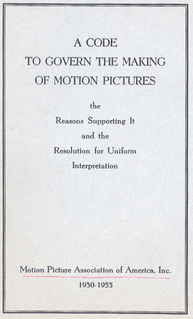
The Motion Picture Production Code was a set of industry guidelines for the self-censorship of content that was applied to most United States motion pictures released by major studios from 1934 to 1968. It is also popularly known as the Hays Code, after Will H. Hays, who was the president of the Motion Picture Producers and Distributors of America (MPPDA) from 1922 to 1945. Under Hays' leadership, the MPPDA, later known as the Motion Picture Association of America (MPAA), adopted the Production Code in 1930 and began rigidly enforcing it in mid-1934. The Production Code spelled out what was acceptable and unacceptable content for motion pictures produced for a public audience in the United States.

William Harrison Hays Sr. was a United States politician, chairman of the Republican National Committee (1918–21), U.S. Postmaster General (1921–22), and, from 1922–1945, the first chairman of the Motion Picture Producers and Distributors of America (MPPDA). He became the namesake of the 1930 Motion Picture Production Code, informally referred to as the Hays Code, which spelled out a set of industry moral guidelines for the self-censorship of content in Hollywood cinema.
The National Legion of Decency, also known as the Catholic Legion of Decency, was a Catholic group founded in 1934 by Archbishop of Cincinnati, John T. McNicholas, as an organization dedicated to identifying for Catholic audiences, objectionable content in motion pictures. Members were asked to pledge to patronize only those motion pictures which did not "offend decency and Christian morality". The concept soon gained support from other churches.

Pre-Code Hollywood was the brief era in the American film industry between the widespread adoption of sound in pictures in 1929 and the enforcement of the Motion Picture Production Code censorship guidelines, popularly known as the "Hays Code", in mid-1934. Although the Code was adopted in 1930, oversight was poor, and it did not become rigorously enforced until July 1, 1934, with the establishment of the Production Code Administration (PCA). Before that date, movie content was restricted more by local laws, negotiations between the Studio Relations Committee (SRC) and the major studios, and popular opinion, than by strict adherence to the Hays Code, which was often ignored by Hollywood filmmakers.
"Frankly, my dear, I don't give a damn" is a line from the 1939 film Gone with the Wind starring Clark Gable and Vivien Leigh. The line is spoken by Rhett Butler (Gable), as his last words to Scarlett O'Hara (Leigh), in response to her tearful question: "Where shall I go? What shall I do?" Scarlett clings to the hope that she can win him back. This line is slightly different in Margaret Mitchell's 1936 novel Gone with the Wind, from which the film is derived: "My dear, I don't give a damn."
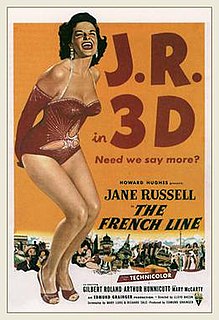
The French Line is a 1953 American musical film starring Jane Russell made by RKO Radio Pictures, directed by Lloyd Bacon and produced by Edmund Grainger, with Howard Hughes as executive producer. The screenplay was by Mary Loos and Richard Sale, based on a story by Matty Kemp and Isabel Dawn. It was filmed in three strip technicolor and Dual strip polarized 3D during what many consider 3-D film's "golden era" of 1952-1954.
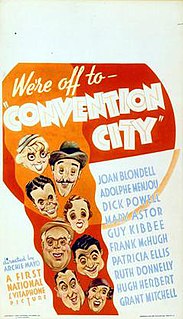
Convention City is a 1933 American pre-Code sex comedy film directed by Archie Mayo, and starring Joan Blondell, Guy Kibbee, Dick Powell, Mary Astor and Adolphe Menjou. The film was produced by Henry Blanke and First National Pictures and distributed by Warner Bros.

The Great Gatsby is a 1926 American silent drama film directed by Herbert Brenon. It was the first film adaptation of the 1925 novel of the same name by F. Scott Fitzgerald. Warner Baxter portrayed Jay Gatsby and Lois Wilson portrayed Daisy Buchanan.
Joseph Ignatius Breen was an American film censor with the Motion Picture Producers and Distributors of America who applied the Hays Code to film production.

White Cargo is a 1942 film directed by Richard Thorpe and starring Hedy Lamarr and Walter Pidgeon. Released by Metro-Goldwyn-Mayer, it is based on the 1923 London and Broadway hit play by Leon Gordon, which was in turn adapted from the novel Hell's Playground by Ida Vera Simonton. The play had already been made into a British part-talkie, also titled White Cargo, with Maurice Evans in 1930. The 1942 film, unlike the play, begins in what was then the present-day, and uses a flashback technique.
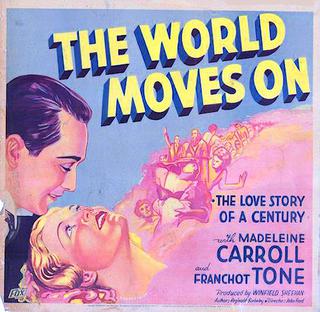
The World Moves On is a 1934 American drama film directed by John Ford and starring Madeleine Carroll and Franchot Tone. It is notable for being the first Hollywood code approved film.
The Gainsborough melodramas were a sequence of films produced by the British film studio Gainsborough Pictures between 1943 and 1947 which conformed to a melodramatic style. The melodramas were not a film series but an unrelated sequence of films which had similar themes that were usually developed by the same film crew and frequently recurring actors who played similar characters in each. They were mostly based on popular books by female novelists and they encompassed costume, such as The Man in Grey (1943) and The Wicked Lady (1945) and modern-dress, such as Love Story (1944) and They Were Sisters (1945) settings. The popularity of the films with audiences peaked mid-1940s when most of the cinema audiences consisted of mainly women. The influence of the films led to other British producers releasing similarly themed works, such as The Seventh Veil (1945), Pink String and Sealing Wax (1945), Hungry Hill (1947), The White Unicorn (1947), Idol of Paris (1948), and The Reluctant Widow (1950) and often with the talent that made Gainsborough melodramas successful.

The Motion Picture Association (MPA) is an American trade association representing the five major film studios of the United States, as well as the video streaming service Netflix. Founded in 1922 as the Motion Picture Producers and Distributors of America (MPPDA) and known as the Motion Picture Association of America (MPAA) from 1945 until September 2019, its original goal was to ensure the viability of the American film industry. In addition, the MPA established guidelines for film content which resulted in the creation of the Motion Picture Production Code in 1930. This code, also known as the Hays Code, was replaced by a voluntary film rating system in 1968, which is managed by the Classification and Rating Administration (CARA).
Hitler's Reign of Terror is an independently released 1934 film that attacked the activities of Adolf Hitler in Nazi Germany, and is often credited as being the "first-ever American anti-Nazi film." The film is a combination of newsreel footage, documentary, and reenactment. Despite the fact that the New York State Censor Board refused the film a license, it played for two weeks in New York City theaters which filled to capacity. In Chicago the film was only released after the title was changed to Hitler Reigns to placate the German government. Mordaunt Hall gave the film a negative review in The New York Times when it was released. Film Daily scoffed at the film for its prediction that Hitler's Germany was a future threat to world peace.

Film censorship in the United States was a frequent feature of the industry since almost the beginning of the motion picture industry until the end of strong self-regulation in 1966. Court rulings in the 1950s and 1960s severely constrained government censorship, though statewide regulation lasted until at least the 1980s.

Ann Vickers is a 1933 American pre-Code romantic drama directed by John Cromwell and starring Irene Dunne and Walter Huston. It is based on the novel of the same name by Sinclair Lewis.

Martin Joseph Quigley Sr. was an American publisher, editor and film magazine journalist. He founded Exhibitors Herald, which became an important national trade paper for the film industry. He was also the founder of Quigley Publishing.
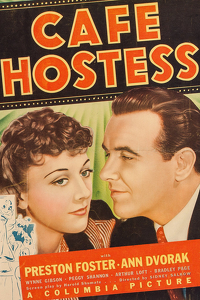
Cafe Hostess is a 1940 American crime film directed by Sidney Salkow and starring Preston Foster and Ann Dvorak. The screenplay was written by Harold Shumate, based on a story by Tay Garnett and Howard Higgin. Prior to filming the studio had been warned by the MPAA that the film did not comply with its code, but it is unclear whether changes were made to the script.

Underworld is a 1937 gangster film directed by Oscar Micheaux, about a recent graduate from an all-black college who moves from the American South to Chicago and gets swept into the criminal underworld. The film was adapted from the short story "Chicago After Midnight" by Edna Mae Baker. Among its stars are Ethel Moses, a Micheaux regular, and Oscar Polk, best known for his appearance in Gone with the Wind two years later.














